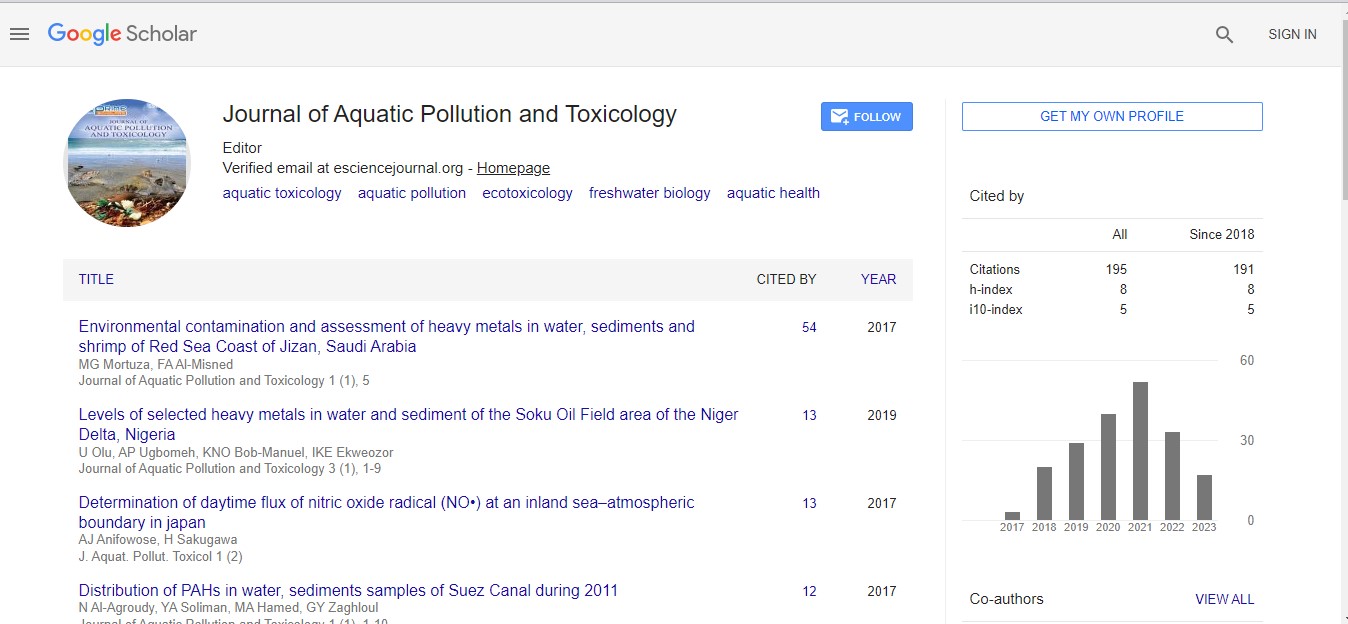Commentary - (2024) Volume 8, Issue 2
Ecotoxicology: Understanding the Impact of Toxins on Ecosystem Health
Liang Chen*
Department of Aquatic Science, Zhejiang University, China
*Correspondence:
Liang Chen,
Department of Aquatic Science, Zhejiang University,
China,
Email:
Received: 29-May-2024, Manuscript No. IPJAPT-24-20017;
Editor assigned: 31-May-2024, Pre QC No. IPJAPT-24-20017 (PQ);
Reviewed: 14-Jun-2024, QC No. IPJAPT-24-20017;
Revised: 19-Jun-2024, Manuscript No. IPJAPT-24-20017 (R);
Published:
26-Jun-2024, DOI: 10.21767/2581-804X-8.2.15
Description
Ecotoxicology, a discipline at the intersection of ecology and
toxicology, delves into the complex interactions between
pollutants and ecosystems. In an era marked by rapid
industrialization, urbanization, and agricultural intensification,
the study of ecotoxicology has become increasingly vital in
unravelling the intricate web of relationships between human
activities and the health of the natural world. At its core,
ecotoxicology seeks to understand how pollutants, ranging
from heavy metals and pesticides to pharmaceuticals and
micro plastics, affect living organisms and the environments
in which they reside. By examining the pathways through
which toxins enter ecosystems, accumulate in organisms, and
propagate through food webs, Eco toxicologists shed light
on the mechanisms underlying ecological degradation and
species decline. One of the primary concerns of ecotoxicology
is the impact of pollutants on biodiversity. Toxic substances can
disrupt the delicate balance of ecosystems, leading to declines
in populations of sensitive species and alterations in community
structure. From aquatic organisms like fish, amphibians,
and invertebrates to terrestrial wildlife such as birds and
mammals, no organism is immune to the effects of pollution.
Furthermore, pollutants can bio accumulate and biomagnified
as they move up the food chain, posing risks not only to
wildlife but also to human health through the consumption of
contaminated food and water. Moreover, ecotoxicology plays
a crucial role in assessing the long-term effects of chemical
exposures on ecosystem function and resilience. Pollutants
can impair critical ecological processes such as nutrient
cycling, primary productivity, and decomposition, leading to
cascading effects throughout entire ecosystems. For example,
pesticides may disrupt pollination services provided by bees
and other insects, jeopardizing the reproductive success of
plants and compromising the stability of entire food webs. In
addition to direct chemical toxicity, ecotoxicology explores the
synergistic effects of multiple stressors on ecosystem health.
Climate change, habitat destruction, invasive species, and
disease outbreaks can interact with chemical pollutants to
exacerbate ecological impacts, creating complex challenges for
conservation and management. By integrating knowledge from
various disciplines, including ecology, physiology, genetics, and
chemistry, Eco toxicologists can unravel the underlying drivers
of environmental stress and develop holistic approaches to
mitigating their effects. Furthermore, ecotoxicology informs
regulatory frameworks and environmental policies aimed at
protecting ecosystems and human health from the adverse
effects of pollution. By conducting risk assessments and
setting safe thresholds for chemical exposures, regulatory
agencies can implement measures to minimize environmental
contamination and prevent ecological harm. Moreover,
Eco toxicological research provides valuable data for the
development of eco-friendly alternatives to hazardous
substances and the implementation of pollution prevention
strategies. In conclusion, ecotoxicology is a vital field of study
that elucidates the complex interactions between pollutants
and ecosystems. By uncovering the mechanisms of toxicity,
assessing ecological risks, and informing environmental
management decisions, Eco toxicologists contribute to the
conservation of biodiversity and the sustainable use of natural
resources. In an increasingly interconnected world, the insights
gained from ecotoxicology are essential for safeguarding the
health and integrity of ecosystems for future generations.
Ecotoxicology studies the effects of pollutants on ecosystems
and their inhabitants. It assesses how contaminants impact
organisms, biodiversity, and ecological processes.
Acknowledgement
None.
Conflict Of Interest
None.
Citation: Chen L (2024) Ecotoxicology: Understanding the Impact of Toxins on Ecosystem Health. J Aquat Pollut Toxicol. 8:15.
Copyright: © 2024 Chen L. This is an open-access article distributed under the terms of the Creative Commons Attribution License, which permits unrestricted use, distribution, and reproduction in any medium, provided the original author and source are credited.

